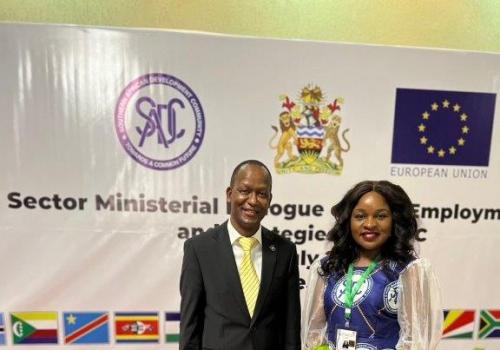The Southern African Development Community (SADC) Joint Sector Ministerial Dialogue on job creation was held in Lilongwe, Republic of Malawi, from 8th to 9th July 2022 to promote joint sector coordination for job creation through coherent and harmonised action on employment and productivity across macro-economic and sectoral policies and strategies.
The Dialogue was attended by Ministers and Senior Officials responsible for Ministries of Finance and Planning, Industry and Trade, and Employment and Labour; SADC Business Council, SADC Private Sector Forum (SPSF), Southern Africa Trade Union Coordinating Council (SATUCC) and youth organisations. Representatives from the International Labour Organisation (ILO) and the United Nations Economic Commission for Africa (UNECA) also participated in the Dialogue.
In her opening remarks, Chairperson of the Dialogue, Honourable Vera Kamtukule, Minister of Labour of the Republic of Malawi acknowledged the strides being made in the region through the implementation of the Regional Indicative Strategic Development Plan (RISDP) (2020-2030), which outlines interventions that have the potential to create meaningful job opportunities.
Honourable Kamtukule observed that measures to create jobs as part of macroeconomic policies had not been fully pursued in the region, resulting in job losses in enterprises within the formal economy due to past structural adjustment policies. She, therefore, called for revolutionary approaches that address the root causes of informality, as well as diversification and industrialization of the regional economy, through enhanced partnerships and private sector participation.
His Excellency Mr. Elias M. Magosi, the Executive Secretary of SADC, called for measures to address the levels of the unemployment and underemployment in the region especially among young women and men.
The Executive Secretary highlighted the importance of industrialisation in the region and emphasised the need for Member States to implement the SADC Industrialisation Strategy and Roadmap (2015-2063), which places emphasis on industrial employment as a key enabler and outcome of properly targeted macroeconomic policies.
During the Dialogue, the Ministers noted that although SADC had realised some economic growth and stability in the past, economic diversification into manufacturing and higher value-added activities had not been realised, resulting in most employment opportunities in the Region being of low-quality and informal in nature.
The Ministers noted that the COVID-19 pandemic had increased joblessness and worsened macroeconomic imbalances. The Ministers also noted the worsening global geo-political tensions, which required Member States to redouble their efforts towards socio-economic recovery and growth.
The Ministers agreed to take advantage of the region’s abundant natural resources to build strong, sustainable value chains in commodities and renewables to spur economic growth and integration into global supply chains.
The Ministers urged Member States to improve their capacity to support value chains and to manage, implement and finance major infrastructure projects, by playing a key role in areas such as water, energy, transport and Information and Communication Technologies (ICTs).
The Ministers underscored the need to put in place determined measures to realize and maintain peace and security, as this was vital for socio-economic development, investment and sustainable job creation. Ministers also highlighted the need to ensure that all socio-economic development processes are fully inclusive with effective participation women, youth and persons with disabilities, among others.
In view of the foregoing, the Ministers recommended that:
- Member States should promote pro-employment policy-making and joint sector coordination, ensuring that national development plans, macroeconomic policy frameworks and sectoral plans consider and directly target employment objectives;
- Member States should promote greater investments towards job creation and the integration of employment targets in macro-economic policies and strategies that are based on the profiling of job creation potential in specific sectors, including allocating budgetary resources;
- Member States should follow up on the conclusions of the Dialogue at national level through institutionalised engagement involving all key actors; and
- SADC should promote the integration of employment objectives across its policies and programmes in order to fast-track progress towards the achievement of socio-economic development and poverty eradication in the Region.
The Ministers thanked the Republic of Malawi for successfully hosting the Dialogue and the European Union for supporting the event.

